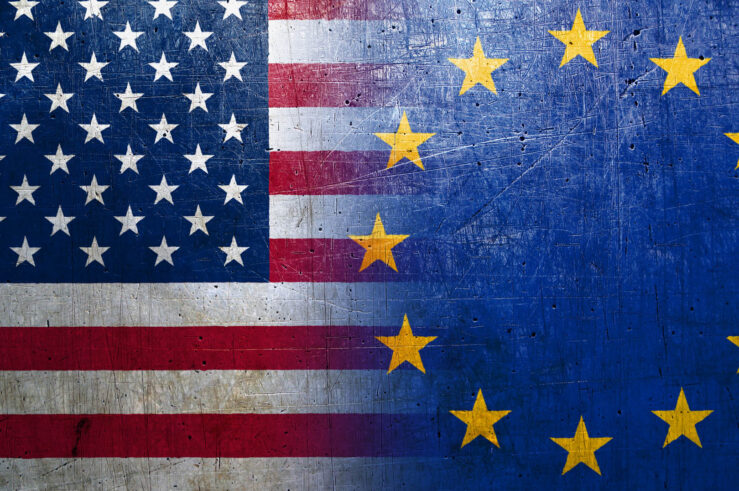Showing archive for: “Common Law”
FTC Antitrust Enforcement and the Rule of Law
The language of the federal antitrust laws is extremely general. Over more than a century, the federal courts have applied common-law techniques to construe this general language to provide guidance to the private sector as to what does or does not run afoul of the law. The interpretive process has been fraught with some uncertainty, ... FTC Antitrust Enforcement and the Rule of Law
How US and EU Competition Law Differ
U.S. and European competition laws diverge in numerous ways that have important real-world effects. Understanding these differences is vital, particularly as lawmakers in the United States, and the rest of the world, consider adopting a more “European” approach to competition. In broad terms, the European approach is more centralized and political. The European Commission’s Directorate ... How US and EU Competition Law Differ
Alston Decision Shows Consumer Welfare Standard Isn’t Broken
From Sen. Elizabeth Warren (D-Mass.) to Sen. Josh Hawley (R-Mo.), populist calls to “fix” our antitrust laws and the underlying Consumer Welfare Standard have found a foothold on Capitol Hill. At the same time, there are calls to “fix” the Supreme Court by packing it with new justices. The court’s unanimous decision in NCAA v. ... Alston Decision Shows Consumer Welfare Standard Isn’t Broken
NY ‘Abuse of Dominance’ Bill Attacks Consumer Welfare and the US Antitrust Tradition
U.S. antitrust law is designed to protect competition, not individual competitors. That simple observation lies at the heart of the Consumer Welfare Standard that for years has been the cornerstone of American antitrust policy. An alternative enforcement policy focused on protecting individual firms would discourage highly efficient and innovative conduct by a successful entity, because ... NY ‘Abuse of Dominance’ Bill Attacks Consumer Welfare and the US Antitrust Tradition
The Globalization of Antitrust: A Cost-Benefit Appraisal
Overview Virtually all countries in the world have adopted competition laws over the last three decades. In a recent Mercatus Foundation Research Paper, I argue that the spread of these laws has benefits and risks. The abstract of my Paper states: The United States stood virtually alone when it enacted its first antitrust statute in ... The Globalization of Antitrust: A Cost-Benefit Appraisal
The Forgotten Strand of the Anti-Monopoly Tradition in Anglo-American Law
Admirers of the late Supreme Court Justice Louis Brandeis and other antitrust populists often trace the history of American anti-monopoly sentiments from the Founding Era through the Progressive Era’s passage of laws to fight the scourge of 19th century monopolists. For example, Matt Stoller of the American Economic Liberties Project, both in his book Goliath ... The Forgotten Strand of the Anti-Monopoly Tradition in Anglo-American Law
The Dishonesty of Conservative Attacks on Section 230
President Donald Trump has repeatedly called for repeal of Section 230. But while Trump and fellow conservatives decry Big Tech companies for their alleged anti-conservative bias, including at yet more recent hearings, their issue is not actually with Section 230. It’s with the First Amendment. Conservatives can’t actually do anything directly about how social media ... The Dishonesty of Conservative Attacks on Section 230
Happy 90th Birthday to Thomas Sowell, One of the Great Scholars of Law & Economics: A Sowell-Inspired Agenda for Racial Justice
One of the great scholars of law & economics turns 90 years old today. In his long and distinguished career, Thomas Sowell has written over 40 books and countless opinion columns. He has been a professor of economics and a long-time Senior Fellow at the Hoover Institution. He received a National Humanities Medal in 2002 ... Happy 90th Birthday to Thomas Sowell, One of the Great Scholars of Law & Economics: A Sowell-Inspired Agenda for Racial Justice
Setting Up a Fair System for Determining Police Misconduct: Towards A Law & Economics Analysis of Qualified Immunity
Yet another sad story was caught on camera this week showing a group of police officers killing an unarmed African-American man named George Floyd. While the officers were fired from the police department, there is still much uncertainty about what will happen next to hold those officers accountable as a legal matter. A well-functioning legal ... Setting Up a Fair System for Determining Police Misconduct: Towards A Law & Economics Analysis of Qualified Immunity
The Pandemic Exception that Proves the Market Rule
[TOTM: The following is part of a blog series by TOTM guests and authors on the law, economics, and policy of the ongoing COVID-19 pandemic. The entire series of posts is available here. This post is authored by Tim Brennan, (Professor, Economics & Public Policy, University of Maryland; former FCC; former FTC).] Thinking about how to think about ... The Pandemic Exception that Proves the Market Rule
The FTC Still Has a Long Way to Go on its “Common Law” of Data Security
Since the LabMD decision, in which the Eleventh Circuit Court of Appeals told the FTC that its orders were unconstitutionally vague, the FTC has been put on notice that it needs to reconsider how it develops and substantiates its claims in data security enforcement actions brought under Section 5. Thus, on January 6, the FTC ... The FTC Still Has a Long Way to Go on its “Common Law” of Data Security
The Politicization of Antitrust Blog Symposium
The operative text of the Sherman Antitrust Act of 1890 is a scant 100 words: Section 1: Every contract, combination in the form of trust or otherwise, or conspiracy, in restraint of trade or commerce among the several States, or with foreign nations, is declared to be illegal. Every person who shall make any contract ... The Politicization of Antitrust Blog Symposium







